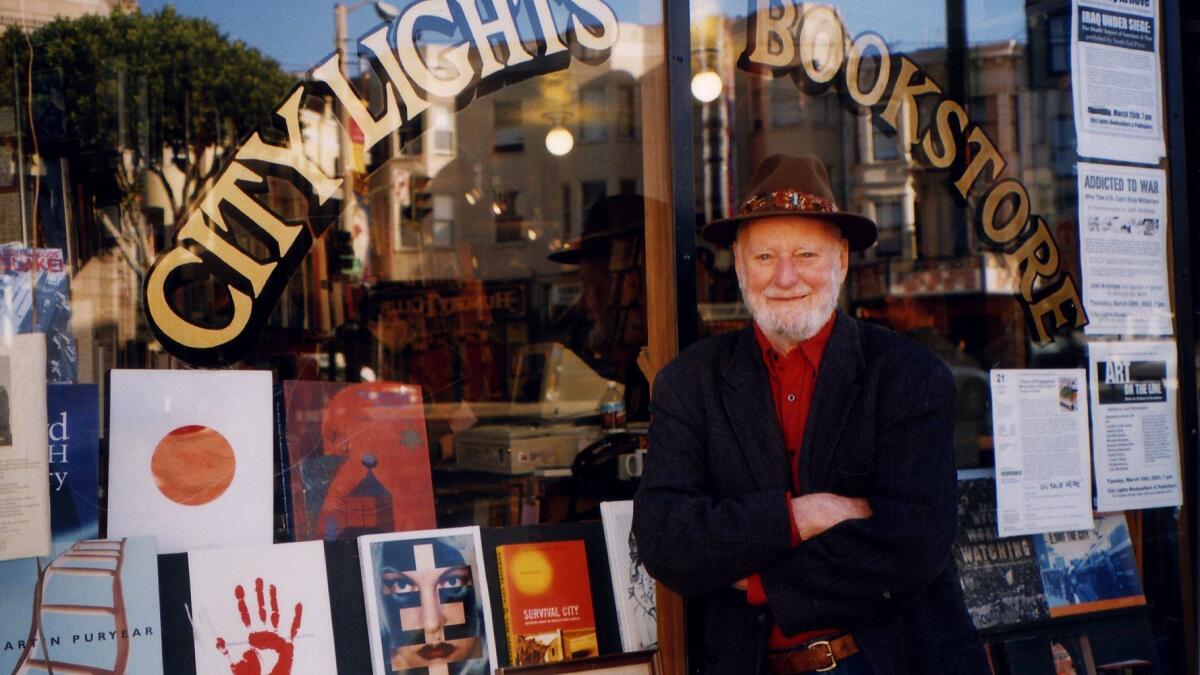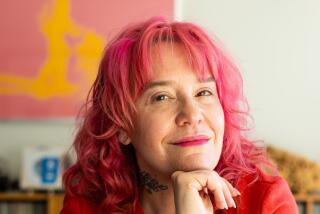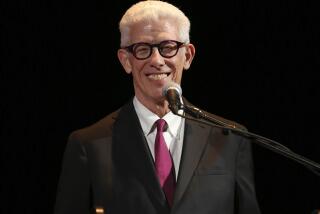Lawrence Ferlinghetti, poet and titan of the Beat era, dies at 101

Lawrence Ferlinghetti was the opposite of the flamboyant literary bad boys drawn to the bohemian haven he nurtured in 1950s San Francisco.
Unlike Beat novelist Jack Kerouac and poet Allen Ginsberg, he was known for neither public drunkenness nor public nudity. Tall and lean, he swam daily and biked to work at City Lights, the San Francisco bookshop that became a landmark of intellectual freedom not long after he co-founded it seven decades ago.
Nor did he seem to mind that the critical attention heaped on his celebrated friends mostly eluded him, even though he was a prolific poet with more than 30 collections published over a half century.
“I was,” he once said, “sort of the guy tending the store.”
The poet, publisher and bookseller, who at 101 outlived most of the major figures of the literary movement he promoted, died Monday evening, according to Starr Sutherland, a friend who is working on a documentary about City Lights. The cause was interstitial lung disease, his son told the Associated Press.
“We intend to build on Ferlinghetti’s vision and honor his memory by sustaining City Lights into the future as a center for open intellectual inquiry and commitment to literary culture and progressive politics,” City Lights said in a statement. “Though we mourn his passing, we celebrate his many contributions and give thanks for all the years we were able to work by his side.”
Ferlinghetti and a partner launched City Lights as the country’s first all-paperback bookstore in 1953, when Ginsberg, Kerouac and other East Coast Beats began adding their woolly voices to the literary renaissance unfolding in San Francisco.
The bookshop — renowned for its bohemian atmosphere and vast collections of international poetry, fiction, progressive political journals and magazines — soon spawned a literary press, which in 1956 published Ginsberg’s controversial epic poem, “Howl.”
Ferlinghetti stood trial for selling “Howl” in a precedent-setting 1st Amendment case, in which the judge found that Ginsberg’s profanity-laced work had “redeeming social significance” and therefore was not obscene. The victory paved the way for publication of other controversial works of literature, including D.H. Lawrence’s “Lady Chatterley’s Lover” and Henry Miller’s “Tropic of Cancer.”
Ferlinghetti and Ginsberg became famous, as did City Lights, still going strong after nearly 70 years in San Francisco’s North Beach district.
In the decades since, Ferlinghetti established himself as a prolific poet with strong populist underpinnings. He is best-known for “A Coney Island of the Mind,” a collection of poems that has sold 1 million copies since it was first published in 1958 by New Directions.
San Francisco’s first poet laureate in 1998, Ferlinghetti was an advocate of poetry as an oral tradition who read his own work with artful vigor.
“Lawrence started probably hundreds of thousands of people reading poetry. They read his poetry first, and then they went on to read more poetry,” poet, essayist and Beat figure Michael McClure, who called Ferlinghetti a master poet, told the San Francisco Chronicle in 2003.
The youngest of five sons, he was born Lawrence Monsanto Ferling in Yonkers, N.Y., on March 24, 1919. His Italian father, who changed the family name after arriving in America, died before Lawrence was born. Soon after, his mother was hospitalized with a nervous breakdown and his family was split up.
Lawrence was sent to live with an uncle, Ludovic Monsanto, and his French-speaking wife, Emily, when he was 2. When the Monsantos’ marriage collapsed, Emily took Lawrence to France. When they returned to New York, she put Lawrence in an orphanage but later retrieved him.
She took him to live in the Bronxville household of the wealthy Bisland family, which had hired her as a governess. But his life was ruptured again when Emily disappeared mysteriously, never to return.
The Bislands — who had lost a son, coincidentally named Lawrence — raised him like their own. They nurtured a love of books and sent him to private schools, but they were emotionally reserved and Lawrence, who would later dub himself the “Director of Alienation” in one of his poems, often felt lonely.
His happiest time came during the Depression when the Bislands sent him to board with another family, the Wilsons, and attend a Bronxville public school. He formed a close bond with one of the Wilson sons, played sports, had a paper route and was a Boy Scout. He also engaged in minor hooliganism with a group of street youths called the Parkway Road Pirates, whose activities brought certain ironies into his young life:
I got caught stealing pencils
from the Five and Ten Cent Store
the same month I made Eagle Scout
The shoplifting incident ended his idyll with the Wilsons. He was enrolled at the Mount Hermon prep school in Massachusetts, where he led a disciplined life of prayer, work and study. He discovered the work of Thomas Wolfe and later studied at Wolfe’s alma mater, the University of North Carolina at Chapel Hill, where Ferlinghetti earned a bachelor’s degree in 1941.
Later that year, just before the attack on Pearl Harbor, he joined the Navy. He commanded a subchaser and participated in the Allied invasion of France. As part of the American occupation in Japan, he toured Nagasaki after the atomic blast that killed 70,000 of its residents. The monstrous sights (“hands sticking out of the mud broken tea cups hair sticking out of the road”) turned Ferlinghetti into a pacifist and political activist.
After the war, he earned a master’s degree on the GI Bill at Columbia University. He continued his education at the Sorbonne in Paris, where he received a doctorate.
Returning to the U.S. in 1950, he settled in San Francisco, where he rented an apartment with Selden Kirby-Smith, a Swarthmore and Columbia graduate he had met on a steamship from New York to Paris. They were married in 1951 and remained together until their divorce 25 years later.
In San Francisco, Ferlinghetti taught French, painted, wrote art reviews and translated the poetry of Jacques Prevert and Guillaume Apollinaire. He was also writing his own poems and launched a friendship with Kenneth Rexroth, dean of the avant-garde poets driving the city’s literary scene.
In 1953 Ferlinghetti invested $500 to join forces with Peter Martin, editor of a literary magazine, to open City Lights in a triangle-shaped building on Columbus Avenue. It was popular from the start, open seven days a week until midnight.
“We couldn’t get the door closed,” Ferlinghetti said.
Conceived as a literary meeting place, the store was “unique from the very beginning,” said Gary Snyder, a Pulitzer-Prize-winning poet, who recalled its abundance “not only of poetry but of cogent and current politics, history — issues that were arising in our minds.”
Ferlinghetti, who became City Lights’ sole owner after Martin left a year later, was unorthodox as a businessman. “Abandon All Despair, Ye Who Enter Here,” read a sign posted by the door of the store, where customers could linger for hours without interference from pushy clerks, and deadbeats and thieves were treated with leniency.
One time, poet Gregory Corso, a cohort of Ginsberg and Kerouac, broke in and stole money from the cash register. Witnesses reported the crime to police but Ferlinghetti merely urged Corso to get out of town, which he did.
Ferlinghetti became a publisher in 1955, when he started the City Lights Pocket Poets Series. The first volume was a collection of his own poems, “Pictures of the Gone World.” Future volumes would feature work by Rexroth, Kenneth Patchen, William Carlos Williams, Robert Duncan, Philip Lamantia, Denise Levertov and Diane diPrima. None of them, however, would earn the notoriety of No. 4 in the City Lights series — “Howl.”
In October 1955 at the Six Gallery in San Francisco, Ginsberg organized a poetry reading that also featured McClure, Rexroth, Lamantia, Snyder and Philip Whalen. Ferlinghetti, who had met Ginsberg some months before when the burly poet came to the bookstore, gave him a ride to the event.
Ginsberg, then 29, read a long, highly personal and experimental work that began, “I saw the best minds of my generation destroyed by madness.” In feverish, stream-of-consciousness style, “Howl” spoke of “angelheaded hipsters,” explicit sex, madness and drug-induced ecstasies. It was an indictment of the conformist 1950s and a poetic anthem for the countercultural rebellion to come. Ginsberg’s rhythmic reading — punctuated by Kerouac’s shouts of “Go! Go! Go!” — mesmerized the audience.
At the end, Ginsberg was in tears. Ferlinghetti was convinced that he had witnessed a defining moment in American poetry.
In a telegram to Ginsberg immediately after the performance, Ferlinghetti echoed Ralph Waldo Emerson’s words to Walt Whitman after reading “Leaves of Grass.” “I greet you at the beginning of a great career,” Ferlinghetti wrote, adding, “When do I get the manuscript?”
Ferlinghetti knew that the poem, with its abundant profanities, could also stir trouble. Before he published it, he showed a copy to lawyers for the American Civil Liberties Union.
“We knew exactly what we were doing,” he told editor Robert Dana in the book “Against the Grain.” “We figured we might very well get busted for it, but in those days it was important to take a stand on the question of censorship. This was the McCarthy era.”
The first printing of “Howl and Other Poems” sold out quickly. The second shipment from Ferlinghetti’s British printer was confiscated on March 25, 1957, by U.S. Customs inspector Chester McPhee. When the ACLU declared its intent to fight the seizure, the federal challenge was dropped, but then San Francisco authorities entered the fray. After purchasing a copy of “Howl,” police officers arrested Ferlinghetti and City Lights clerk Shig Murao on charges of selling lewd and obscene material.
The charges against Murao were dropped, so only Ferlinghetti stood trial. The shy bookshop owner emerged as a stalwart defender of the 1st Amendment and a new kind of writing.
“It is not the poet but what he observes which is revealed as obscene,” he said of “Howl” in a column for the San Francisco Chronicle. “The great obscene wastes of ‘Howl’ are the sad wastes of the mechanized world, lost among atom bombs and insane nationalisms.” He thanked McPhee for making Ginsberg’s poem famous.
Ferlinghetti was defended by a team of the ACLU’s top lawyers and celebrated criminal attorney Jake Ehrlich, who had represented murderer Caryl Chessman. While the prosecution offered only two expert witnesses — a private elocution teacher and an instructor from Catholic University of San Francisco — the defense filled the stand with prominent names in American literature, including James Laughlin, publisher of New Directions; Henry Rago, editor of Poetry Magazine; Barney Rossett, editor of Grove Press; and poet-critic Mark Schorer, who essentially gave the judge an education in literary criticism.
On Oct. 3, 1957, Judge Clayton Horn handed down his ruling. “Evil to him who thinks evil,” Horn said of “Howl” and obscenity in his 39-page opinion, and set Ferlinghetti free.
Let us feed the pigeons at the City Hall urging them to do their duty in the Mayor’s office.
In the ensuing years, Ferlinghetti intensified his political activities. He visited Chile and Cuba. He demonstrated against the Vietnam War and was arrested with 67 others, including folk singer Joan Baez, after participating in a 1967 protest at an Oakland Army induction center. On the day in 2003 when the U.S. invaded Iraq, he closed the bookshop in protest.
“To be disengaged is to be dead,” he said in a critique of the Beat philosophy of detachment.
Ferlinghetti did not consider himself a Beat writer and did not care for much of Beat literature; he turned down, for instance, the manuscripts for Kerouac’s “On the Road” and William Burroughs’ “Naked Lunch,” both of which became modern classics.
In Ferlinghetti’s world, what comes through is an abiding affection for the commonplace. He was often called a poet of the people for drawing his inspiration from “the ordinary sights and sounds of daily life,” biographer Barry Silesky observed. So he wrote in the poem “Dog” about
Fish on newsprint
Ants in holes
Chickens in Chinatown windows
Their heads a block away
Like most of his work, this poem was meant to be read aloud, using colloquialisms, wordplay, alliteration. In “A Coney Island of the Mind” he wrote several poems with jazz accompaniment in mind. He recorded two of the poems — “Autobiography” and “Junkman’s Obbligato” — with the Cellar Jazz Quintet of San Francisco on a 1957 album with Rexroth called “Poetry Readings in the Cellar.”
Among his other poetry titles are “Pictures of the Gone World” (1955), “Endless Life” (1984) and “A Far Rockaway of the Heart” (1997). He also wrote plays, novels and broadsides, notably “Tyrannus Nix” (1969), an attack on the Richard M. Nixon presidency.
“Coney Island” received mixed reviews from critics. Typical was Harvey Shapiro’s critique in the New York Times, which called it “a grab bag of undergraduate musings about love and art, much hackneyed satire of American life and some real and wry perceptions of it.” Yet it remains one of the most-read books of modern American poetry, characterized by what Silesky called a “combination of open-hearted lyricism and satirical wit.”
Serious critics and even some of his friends dismissed him. Corso and others in the Beat circle “consider me a business man with a loose pen,” he wrote in a letter to Ginsberg included in the 2015 volume “I Greet You at the Beginning of a Great Career: The Selected Correspondence of Lawrence Ferlinghetti and Allen Ginsberg, 1955-1997.”
His fans, however, were vociferous in their admiration. Well into his 80s, Ferlinghetti performed his poetry on college campuses, where audiences greeted him like a rock star, shouting out the titles of favorite poems. Hundreds showed up at City Lights for his 100th birthday in 2019.
“I have committed the sin of too much clarity,” he told a biographer, reflecting on the critical neglect. Poetry, he wrote in “Americus, Book I” (2004), “is eternal graffiti in the heart of everyone.”
It is all things born with wings that sing.
It is a voice of dissent against the waste of words and the mad plethora of print.
It is what exists between the lines.
Ferlinghetti is survived by a son, Lorenzo; a daughter, Julie Sasser; and three grandchildren.
Woo is a former Times staff writer.
More to Read
Start your day right
Sign up for Essential California for the L.A. Times biggest news, features and recommendations in your inbox six days a week.
You may occasionally receive promotional content from the Los Angeles Times.







